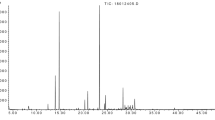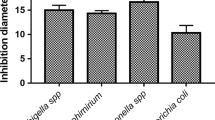Summary
To observe the germistatic and germicidal effects of origanum volatile oil (OVI) on the dysentery bacteria, the abdominal cavity of mice was infected withShigella sonne (Sh. sonnei) andShigella flexneri (Sh. flexneri) F2a. After OVI was given to the mice via gastric lavage, the effects of OVI on the infected mice were observed. The minimal inhibitory concentration (MIC) and minimal bactericidal concentration (MBC) for dysentery bacteria were determinedin vitro. The results showed that origanum volatile oil showed obvious protective effect on mice infected withSh. sonnei andSh. flexneri F2a. and it had germistatic and germicidal effects on dysentry bacteria. We are led to conclude that origanum volatile oil is an effective medicine against the infection of dysentery bacteria.
Similar content being viewed by others
References
The Zimbabwe Bangladesh South Africa (Zimbasa) Dysentery Study Group. Multicenter, randomized, double blind clinical trial of short course versus standard course oral ciprofloxacin for Shigella dysenteriae type 1 dysentery in children. Pediatr Infect Dis J, 2002, 21 (12): 1136
Iwalokun B A, Gbenle G O, Adewole T Aet al. Shigellocidal properties of three Nigerian medicinal plants: Ocimum gratissimum, Terminalia avicennoides, and Momordica balsamina. J Health Popul Nutr, 2001, 19 (4): 331
Manohar V, Ingram C, Gray Jet al. Antifungal activities of origanum oil against Candida albicans. Mol Cell biochem, 2001, 228(1–2):111
Compiling Team of the Pharmacopoeia of Chinese Medicinal Herb. Pharmacopoeia of Chinese Medicinal Herb (Book One) (Chinese). Beijing: Publishing House of Peoples Health. 1976, 34
Lin Q H, Liu B, Xu Y Wet al. Antibiotic effect in vitro of volatile oil of origanum vulagare L. on enteritiscausing bacteria (Chinese). Chin J Appl Environ Biol, 1997, 3(1): 76
Luo C Y, Luo P Y, Xiao X Xet al. Infection of Intestinal Tracts (Chinese). Shanghai: Publishing House of Tongji University, 1990. 43–51
Manohar V, Ingram C, Gray Jet al. Antifungal activities of origanum oil against Candida albicans. Mol Cell Biochem, 2001, 228(1–2):111
Xa CJ, Yu L H. The distribution of Dysentry Bacilli and Monitoring of Their Drug Resistance (Chinese). J Clin Intern Med, 2002, 19(5):388
Author information
Authors and Affiliations
Additional information
LIAO Fang, female, born in 1960, Associate Professor
Rights and permissions
About this article
Cite this article
Fang, L., Qinghua, H., Zhende, Y. et al. Experimental study on the antibacterial effect of origanum volatile oil on dysentery bacilliin vivo andin vitro. Current Medical Science 24, 400–403 (2004). https://doi.org/10.1007/BF02861878
Received:
Published:
Issue Date:
DOI: https://doi.org/10.1007/BF02861878




